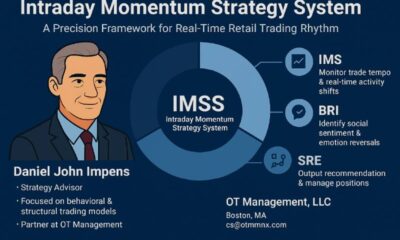Tech
Significance of Training Marketers on How to Leverage AI Technologies and Platforms

We are living in a hyperconnected world. Everything is rapid, instantaneous, and in real-time. Long before artificial intelligence (AI) became a common term, forward-thinking businesses were already preparing to meet the needs of modern connectivity – both in the workplace and across consumer-facing products, services, and campaigns.
However, when AI became widespread, it did more than merely enhance our already hyper-connected world; it completely altered it.
Take, for example, the dramatic increase in workplace productivity. New-age generative AI tools have revolutionized how workers engage with one another and with customers, in addition to automating the mundane.
For example, a marketing team that was previously weighed down by tasks such as drafting lengthy emails, sorting through complex data, and summarizing notes from client meetings is now free to focus on a campaign’s creative and strategic aspects.
Be that as it may, efficiency alone isn’t the AI endgame. With the appropriate implementation, AI can unleash enormous value by providing updated, engaging, and highly personalized consumer experiences (CX). Let’s find out how.
Staying relevant with AI
Brands from various industries have experimented with AI to some level, but many are still struggling to maximize its value across the organization. Why? Because of the excellent, old data.
Data is the fundamental power that drives artificial intelligence algorithms, permitting them to learn, adapt, and go with informed decisions. As a result, the quality and quantity of data processed by AI have a significant impact on its effectiveness. However, for many firms, enormous amounts of data are dispersed across multiple sources and must be collected and organized.
Today, the democratization of AI, along with the power of cloud computing and advanced analytics, makes it easier to implement AI-driven use cases at scale across any company. It would be irresponsible of brands and businesses not to seize this opportunity and, at the very least, use the potential of AI to build capacity to focus on generating superior consumer experiences.
AI’s ability to make sense of large data sets and give actionable insights is significantly changing how brands and organizations communicate with their customers. Today, brands can use AI to create personalized marketing strategies, automate customer service with chatbots and virtual agents, and gain deeper, more meaningful insights into consumer behavior.
Hyper-personalization at scale
We see a big appetite for customization. Our customers want to reach their full potential and be there for their customers when it matters the most. This is why the concept of ‘hyper-personalization’ has quickly risen to the top of the list of business priorities. This is especially true when firms continue to compete in a fiercely competitive market where consumer loyalty is transitory.
Hyper-personalization elevates the concept of customization to a new level, with each interaction feeling personally suited to the individual.
Consider member-based services, which require clients to sign up and pay a regular premium. Customers who make an ongoing investment anticipate a highly personalized service. In other words, how can the brand assist members in maximizing their advantages and proactively personalizing to their needs and desires based on their name, address, family history, shopping behaviors, and other relevant information?
This could include recommending the best program for them, offering cost-saving options, tailoring services to meet their specific requirements, making special promotional offers, offering partner discounts, offering family packages, and more.
Hyper-personalized services are now no longer limited to a small number of VIP customers; this level of customer experience is now available to all customers, every time. In fact, most customers are rapidly moving away from brands that send generic communications that clearly aren’t tailored to their specific needs.
Modernizing CX foundations
There’s little doubt that incorporating AI into business operations, the workplace, and marketing/sales activities is a fascinating concept. However, this will not be possible without the correct combination of technology, data, people, and frameworks to ensure successful implementation and long-term success.
Consider a business that wants to use AI to improve its customer experience. While AI has previously been used to provide personalized recommendations, it now provides even more powerful insights by discovering connections across customer data subsets, resulting in significant time savings on data analysis.
However, for AI to create meaningful value and results, businesses must have a robust tech foundation that allows them to manage and analyze massive amounts of data. This infrastructure will also be essential for safely storing enormous volumes of data from many sources and platforms, which AI solutions will train on to deliver insights.
However, technology and data alone aren’t sufficient. A strong tech and data procedure should be combined with a responsible AI framework. As artificial intelligence keeps on reshaping enterprises, organizations should guarantee that their reception of artificial intelligence is directed by the best standards of data governance, security, and ethics.
At last, don’t forget the human element: your people. People are a key part of driving exceptional CX for your brand. They are the ones who will bring AI to life in your organization, converting data into useful consumer interactions.
Whether they work on a marketing team, in-store, or in a call center, all employees must be trained on how to use AI technology (such as prompt creation) to retrieve better results that truly simplify their workload while also creating the capacity to better service customers.
The reality is that AI is here to stay, and the demand for AI-driven experiences is only growing. This is why businesses have been experimenting with AI use cases and are at the forefront of global AI adoption.
In any case, to effectively execute AI at scale, associations need to guarantee strong data foundations and governance mechanisms.
-

 Sports4 weeks ago
Sports4 weeks agoFIFA Club World Cup 2025: Complete List of Qualified Teams and Groups
-

 Sports3 weeks ago
Sports3 weeks agoAl Ahly vs Inter Miami, 2025 FIFA Club World Cup – Preview, Prediction, Predicted Lineups and How to Watch
-
Health1 week ago
Back to Roots: Ayurveda Offers Natural Cure for Common Hair Woes
-

 Tech2 weeks ago
Tech2 weeks agoFrom Soil to Silicon: The Rise of Agriculture AI and Drone Innovations in 2025
-

 Sports3 weeks ago
Sports3 weeks agoFIVB Men’s Volleyball Nations League 2025: Full Schedule, Fixtures, Format, Teams, Pools and How to Watch
-

 Startup3 weeks ago
Startup3 weeks agoHow Instagram Is Driving Global Social Media Marketing Trends
-

 Television4 weeks ago
Television4 weeks agoTribeca Festival 2025: Date, Time, Lineups, Performances, Tickets and How to Watch
-

 Sports3 weeks ago
Sports3 weeks agoWorld Judo Championships 2025: Full Schedule, Date, Time, Key Athletes and How to Watch



















